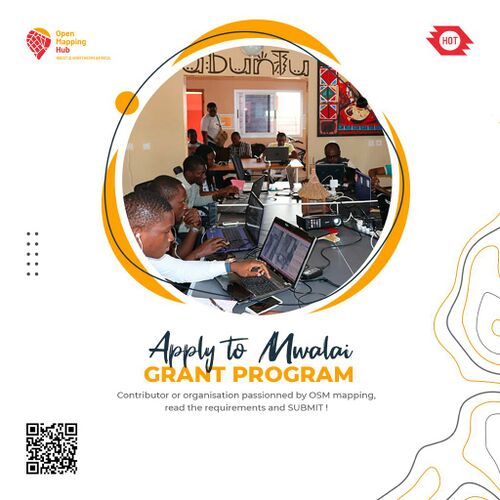WNAH Mwalai Grant-Program-En
Impulse & Improve OSM Data program : Mwalai
Background
There are currently one billion people who live in places that are not on the map. These places are often at high risk of disasters or present an ever-increasing exposure to poverty. Maps are essential in humanitarian response, as well as providing healthcare and other basic services like water, sanitation, and education. Maps provide crucial data about where and how people live — including homes, hospitals, roads, and rivers. Maps created by for-profit companies are usually driven by a business case; such as advertising or data sales. This approach leaves out many lower income places because it is not profitable to map those areas. Without a map, it is impossible to dispatch humanitarian workers effectively, plan a vaccination campaign, or trace the spread of diseases, leaving vulnerable places without access to humanitarian aid.
In that context, the Humanitarian OpenStreetMap Team's West and North Africa Regional Open Mapping Hub (WNAH) is launching the Mwalai (Impulse & Improve OSM Data program) grant program to enhance data production and improve data quality in the OpenStreetMap database.
Program Objective
-To support the open mapping community, contributors in the West and North African region by providing the required resources to improve quantitatively and qualitatively the OpenStreetMap database.
-To stimulate the contribution to OSM through the use of available low-cost open mapping technologies.
Availability
Applications are open to organizations or OSM contributors from fourteen (14) countries: Algeria, Benin, Cape Verde, Central African Republic, Chad, Congo, Côte d'Ivoire, Equatorial Guinea (Central), Guinea, Guinea-Bissau, Mali, Morocco, São Tomé and Príncipe, Sierra Leone.
Applicants may apply for an OSM Mapping Project Grant between $3,000 and $10,000. Successful applicants will have carefully considered the technical criteria listed above. All proposals must include a project plan and budget that properly reflects the proposed activities.
Technical Criteria
Organizations or OSM contributors seeking grants must meet the following technical criteria.
For organizations:
- Must be legally and locally registered organizations, including OpenStreetMap communities, community-based organizations (CBOs), civil society organizations (CSOs);
- Must have demonstrated accountable leadership, including governance and financial management systems;
- Must have a clear alignment between project objectives and Mwalai program objectives;
- Must include a detailed and realistic budget;
- Must be experienced in the use of mapping technologies related to OSM;
- Must include a detailed and realistic project plan that outlines activities planned (minimum 5 months of activities);
- Organizations may apply for a grant between $5000 and $10,000.
For OSM contributors
- Be an active OSM contributor with at least 2 years of active contributions focused on data collection, OSM mapping, and quality control;
- Must be experienced in the use of mapping technologies related to OSM;
- Must have a clear alignment between project objectives and Mwalai program objectives;
- Must include a detailed and realistic budget
- Must include a detailed and realistic project plan that outlines activities planned (minimum 5 months of activities);
- Contributors may apply for a grant of between $3,000 and $5000
Note : Multiple contributors can work together to develop activities.
Suggested activities include
Mapping parties.
Data collection uploaded to OSM
Thematic mapping to feed the OSM database
Mapathons
Other activities linked to the OSM data production or quality control.
Outputs:
Simultaneous and active contribution to OSM for at least 10 countries
Regular mapping activities are organized
Communities interact regularly at the regional level
Short term outcomes:
Geo-data from target countries in OSM have increased significantly
Increased OSM contribution
Improved quality of OSM data
Long term outcomes:
Sustained contribution to OSM beyond the grant periods.
The availability of data on OSM is both qualitatively and quantitatively adequate.
Phase
Phase 1: Kick-off and Call for Applications
Phase 2: Screening
An evaluation committee composed of the WNAH team to evaluate the applicants and make a shortlist of candidates will be set up.
Phase 3 Interview & Shortlisting
The shortlisted candidates will be interviewed in order to make a final decision on which applicants will receive the grants.
Phase 4 Communication
An announcement will be made to announce the selected applicants ( through email, social networks, website)
Phase 5: Implementation
Applicants will receive grants for the execution of their projects.
Phase 6: Follow-up and assessment.
Follow-up and assessment of the ongoing projects
